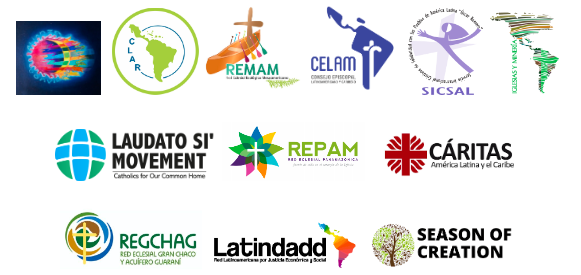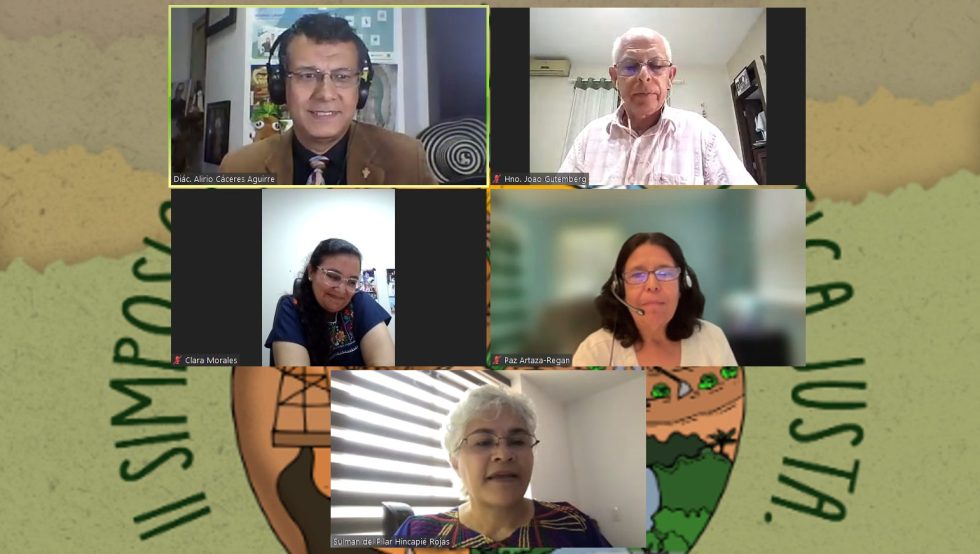2nd Symposium for the Common Home Care of Latin America and the Caribbean
7 September 2023
We, members of church and civil society organizations, of the scientific and academic community, and the Church, in communion with different denominations of faith, convened at the II Symposium for the care of the common home: “Latin America and the Caribbean on the road to COP 28: The acceleration of the just energy transition in the key of integral ecology”, we have reflected in the light of the Gospel, the Social Doctrine of the Church and scientific knowledge, on the assessment of the acceleration of the just energy transition in the key of integral ecology for our continent, in preparation for the upcoming COP 28 climate summit. Gathered virtually through the Zoom platform, we point out the following:
- As members of the Church in Latin America and the Caribbean, in this Season of Creation, summoned by the motto “Let justice and peace flow (Am 5:24)”, we have understood that the just energy transition has to do with knowing how to tune in to the beat of the human heart, under the rhythm of voracious, frenetic, predatory and destructive consumption – which a fraction of our societies have carried out – with that harmonious and deep rhythm of the heartbeat of creation, which brings sobriety and calm to those who know the “Good Life.” The Earth is our common, fragile home; a garden, an oasis, full of life in the desert of space – as its image seen from an artificial satellite reveals – that can only flourish if God provides the rains and human beings work it (Gen. 2, 4), care for it and cultivate it (Gen. 2, 25); otherwise it would become a place of death and would cease to be a theological place where God manifests Himself.
- We have seen that climate change and biodiversity loss, according to science, affect each other and are the two main threats to the sustainability of life on Earth, that it is the poorest people who suffer from their effects and that such threats have been recognised by all countries for more than 30 years at the United Nations and reflected upon in faith in the Social Doctrine of the Church. The effects of climate change are increasingly evident: extreme droughts, stress on the tropical biome, rising sea levels, floods, forest fires, and melting sea ice in the Arctic and Antarctic, among others. The latest UN Climate Change Report Card clarifies that the solution lies in drastically reducing carbon dioxide (CO2) emissions by moving away from fossil fuels (coal, oil, and gas) starting in the current decade.
- However, though the Paris Agreement sets the warming limit to be less than 2ºC, and better if it is 1.5ºC, no international policies have yet agreed upon to set targets and deadlines necessary to generate renewable energy and decrease CO2 emissions, which is much needed. The Paris Agreement could be complemented by a binding Treaty to “end the fossil fuel era” and coordinate efforts to transit to a post-extractive economy gradually. Instead, the generation of technologies and infrastructures that maintain the same system of production and consumption and the same need for energy is being pushed forward, increasing the pressure and voracity on metallic minerals and forest species that constitute a new threat to biodiversity and affected populations – especially in the global south. We have also seen that hydrocarbon and mining activities pollute the land, air, and water, killing all natural life in the Amazon and the forests, as well as the cultures of the peoples who live there and many defenders of the territories.
- We feel called to a formation for action and prophetic advocacy so that we can make this Earth, a gift of divine Providence, a credible sign of the “new heavens” and the “new earth” we are waiting for, of the Kingdom of God that is at hand. This faith in the new creation, in a new earth, can be sustained through integral ecological conversion, personal and communal, of lifestyles and the economic model, more simple and sober lifestyles, and towards cyclical economic models that are respectful of the rhythms of nature. To be integral, it must go to the roots of the technocratic paradigm (LS 106-114). Pope Francis has given us examples on several occasions of the prophetic denunciation of false solutions, which idolise capital and appear to be a change, without changing the underlying mercantilist logic, such as the carbon market and its financial speculation (LS 171), or the new electric cars, which the extractivist logic promotes to justify and maintain consumption, production, and monopoly of the global economy. The people of Ecuador have also recently set an example by demanding that crude oil be left in the ground, saying yes to Yasuní, a resounding yes to life and no to exploitation, despite the context of insecurity, violence, and inequality.
- The energy transition risks being unjust again if it only involves replacing the burning of fossil fuels with the use of renewable energy without changing unsustainable lifestyles and destructive modes of production and consumption. Simply extending market logic to renewable energy is not sustainable. All economic activity “must be directed towards the common good, which is above all the responsibility of the political community” (CiV 36). This implies applying the principle of gratuitousness and the logic of gift in the new economic relations on the Earth’s goods, such as energy, climate, and biodiversity.
- The diversity of views on a just energy transition stems from the tensions between the urgent and the profound. The urgency of the climate crisis puts us at risk of repeating the historical mistakes of colonialism, exploitation, and inequalities: change is not only technological. The profound action of socio-technological conversion and political power over energy will require more time than we have, so how can we combine the two problems? It is clear that there is a multiplicity of spatio-temporal scales. We believe that one of the ways to address this urgency is to recognise the traditional territories, the different cosmo-livings, and cosmovisions that have coexisted harmoniously with our sister Mother Earth for centuries.
- Energy justice is achieved when energy sources are distributed fairly in democratic territorial processes, involving the people affected under the principle of restoring communities historically affected by the socio-technical web that is energy. These processes involve different ways of exercising power and its abuse. Long-term actions imply a profound transformation that includes new social, political, and technological narratives.
- The burden of illegitimate and unpayable public debts and their impact on the consolidation of speculative and extractivist economic models that violate the sovereignty and rights of peoples and nature impedes the necessary action to care for the common home, achieve a just energy transition, and ensuring a full life for all peoples. Reclaiming financial sovereignty, dismantling corporate power and impunity, building a new architecture of global cooperation, and decommodifying the proposed pseudo-solutions are inescapable steps toward climate justice.
- Thus, a just energy transition for the peoples of the continent must consider the human rights approach and the protection of biodiversity and promote indigenous sovereignty and self-determination in all efforts related to integral human development. A change in the energy matrix is insufficient if it is not part of an integral transformation process that includes changes in the organisation, ownership, and distribution of energy production and consumption systems.
- Once again, we affirm that we cannot continue with an economy of maximising greed at the expense of our sister mother Earth and the poor. We need to develop new lifestyles, new forms of production and consumption, and, in short, a new harmonious relationship of human beings with each other and with nature in such a way that renewable energies are genuinely an opportunity for the integral development of every human being, and are not new excuses to continue destroying. That is why we advocate divestment from fossil fuels and mining as concrete steps towards a just energy transition away from the fossil fuel era.
We entrust the work of this symposium to Our Lady of Guadalupe, Mother and Sister, Patroness of America, to intercede for our increased commitment to care for our common home.

References:
- Cf. Díaz, S. et al. (2019). The Global Assessment Report on Biodiversity and Ecosystem Services of the Intergovernmental Science-Policy Platform on Biodiversity and Ecosystem Services: Summary for Policymakers (IPBES), Bonn. Cf. Linn Persson, Bethanie M. Carney Almroth, Christopher D. Collins, Sarah Cornell, Cynthia A. de Wit, Miriam L. Diamond, Peter Fantke, Martin Hassellöv, Matthew MacLeod, Morten W. Ryberg, Peter Søgaard Jørgensen, Patricia Villarrubia-Gómez, Zhanyun Wang, and Michael Zwicky Hauschild (2022). Outside the Safe Operating Space of the Planetary Boundary for Novel Entities, Environmental Science & Technology, 56 (3), 1510-1521; DOI: 10.1021/acs.est.1c04158.
- Francis (2015). Encyclical Letter Laudato Si’ (LS).
- IPCC AR6 WGI, 2021: Climate Change 2021: The Physical Science Basis. Contribution of Working Group I to the Sixth Assessment Report of the Intergovernmental Panel on Climate Change [Masson-Delmotte, V., P. Zhai, A. Pirani, S.L. Connors, C. Péan, S. Berger, N. Caud, Y. Chen, L. Goldfarb, M.I. Gomis, M. Huang, K. Leitzell, E. Lonnoy, J.B.R. Matthews, T.K. Maycock, T. Waterfield, O. Yelekçi, R. Yu and B. Zhou (eds.)]. Zhou (eds.)]. Cambridge University Press. In press, A1, SPM-5. https://www.ipcc.ch/report/ar6/wg1/downloads/report/IPCC_AR6_WGI_Full_Report.pdf
- Such as, for example, the Fossil Fuels Non-Proliferation Treaty.
- Pope Francis (1 September 2023.) Message for the World Day of Prayer for the Care of Creation.
- On 20 August 2023, the Ecuadorian people went to the polls to elect political candidates. The government added a plebiscite on whether or not they agreed that the oil in the subsoil of the Yasuní National Park in Ecuador’s Amazon, one of the most important and diverse biodiversity reserves on the planet, should remain untapped. The answer of 60% of Ecuadorians was a resounding Yes to life and a resounding No to exploitation.
- Cf. Araya, P., Fleischmann, M., Reyes, A., González, K., Oyarzún, T., Sánchez, J., Billi, M., Louder, E., Amigo, C., Urquiza, A., Riquelme, R., Rojas, V. (2023). What do we talk about when we talk about Just Energy Transition? Articulating multiple scales, resolutions and meanings. NEST-r3 Working Paper N°4, Santiago, Chile
